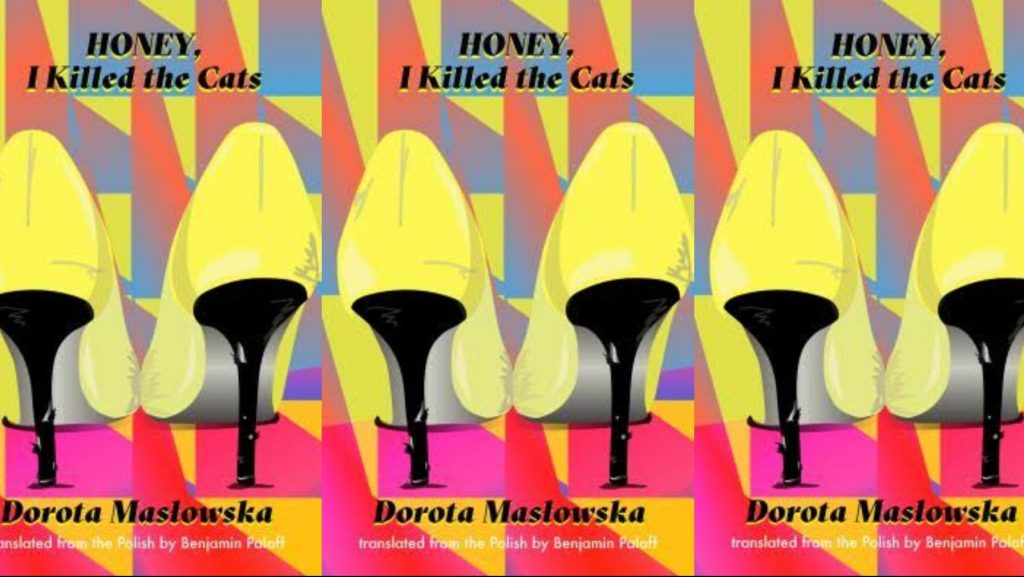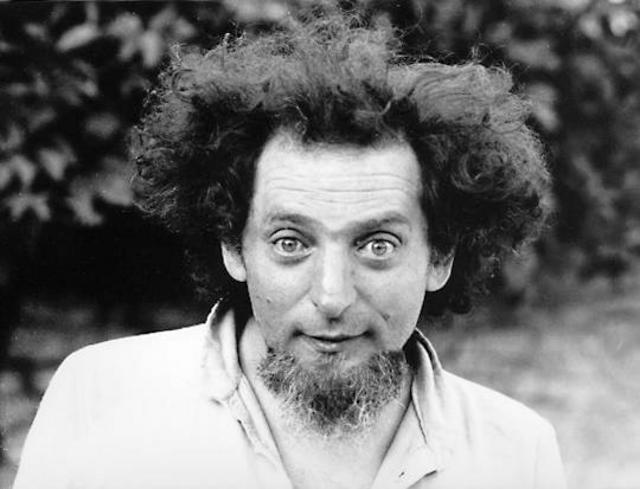Dorota Maslowska’s Honey, I Killed the Cats is a novel about two women who are so delighted to partner up for yoga and mall trips, so busy watching themselves have a friendship experience, that they never stop to wonder if they actually like each other. Published in October 2019 on Deep Vellum, Benjamin Paloff has translated Maslowska’s 2012 novel from the Polish into the English. Farah and Joanne briefly, desperately, latch onto each other in a performance of friendship, in a vague caricature of a city. Farah fixates especially hard on Joanne who, early in the book, gains a boyfriend and a new eroticism:
Store clerks left their registers, baristas stopped making espresso… and she stood there, smelling sweetly of sweat, shawarma, lipstick, the several different perfumes she’d quickly sprayed on herself at Sephora, hair spray, and hot love, with its intrinsic note, it so happens, of urine.
Farah’s world is shaken by the appearance of this boyfriend, because it disturbs the “twinness” that Maslowska says women exaggerate to feel closer in their friendships. When she realizes that Joanne is having sex, Farah sticks her own expired birth control into her purse, so that she can strategically spill them out and “stuff them back in with that exasperation that is so typical of children chastising their imaginary friends.” As for Joanne, getting a boyfriend makes her friendship with Farah pointless, except as a witness to the romance. She feeds off Farah’s envy, and her happiness is never as sweet without Farah there to covet the attention she now gives her new beau.
Farah and Joanne are Sex in the City wannabes lost in a world closer to Fight Club, a surreal metropolis filled with advertisements, commodified spiritualism, and aimless young people desperate to find the friend or accessory that will finally mold them into a bearable version of themselves. After Farah is (in her mind) abandoned by Joanne, she wanders the mall buying things for an imagined new life. Her brain runs through dozens of fantasies of Joanne suddenly coming across her someday, when she’s wearing all the right things and surrounded by adoring and eccentric friends. Farah wants to stop being a doormat and stop defining herself based on Joanne’s standards, but her transformation is meaningless if Joanne doesn’t see it.
Farah is just as unwise in her next platonic obsession: Go, who hides her heiress status under a punk haircut and bitter rants about the rich. Farah sees Go as a door to a world of fun and rebellious creativity, but the only way she can enjoy this compelling life is to imagine it as a perfectly framed moment designed to be seen from the outside: “Oh, if only Joanne could see her now! Laughing her ass off, or at least… laughing, chatting… well… listening… surrounded by… at any rate, standing not far from this bohemia. Her poor, stupid Farah; she’d simply burn up with envy.”
Farah is bound to be disappointed; neither Joanne, Go, or any woman in the city will ever fulfill her true desire, to blur and stir together until Farah’s identity is buried. “[Farah] senses her own alienation. And, at the same time, a sort of longing for Go, who is sitting next to her, instead of being Farah together with Farah.” Farah wants desperately to be understood, to engulf or be engulfed, but she never imagines that anyone around her has any inner life of their own. As Farah’s waking life is dragged deeper into Go’s melodrama and her sleep is possessed by increasingly violent dreams that she shares with Joanne, she becomes increasingly unhinged.
Maslowska’s first novel, Snow White and Russian Red, was translated into a dozen languages and made into a motion picture. While that first book (published when she was only nineteen) satirized her own experiences as a young person in Poland, she took a different strategy with Honey, I Killed the Cats. In an interview with the Polish magazine Polityka, Maslowska says:
Up until now I wrote about the so-called here and now, it was enough to step outside of my house and everything spoke to me, now I had to work within a world carefully constructed from bits of another reality. I had to create everything, build it bit by bit. Ambitious, but also very laborious. But it was out of exhaustion with the matter of Poland that a completely abstract subject took over me, I needed an escape, an excursion.
This excursion unfolds beautifully, even when the reader is tested with truly unlikeable main characters. Paloff is able to preserve Maslowska’s energy and surprising wordplay in this translation, and the prose brings life to the setting in a way that energizes the story while distracting from the secondhand embarrassment we feel for Farah and Joanne. The characterizations bring a fun and sensual joy to a plot that seems unconcerned with redemption of any kind. For instance, in Farah’s description of Joanne’s boyfriend: “A bald spot that, despite his efforts, was unruly and inquisitive, in its own way intelligent, and time and again would emerge like a sensation-greedy egg out of the fluffy, if sparse, hay of his hair, casting its cheerful flashes of light left and right.”
The plot comes at a drizzle, and Maslowska’s focus on the strange language allow for slow pleasures as this short novel unfolds and folds back into itself. In one scene from their shared dreamscape, Joanne picks up a torn issue of Yogalife and reads from a so-called scientific article: “Love does not exist, while what we are in the habit of taking for love is merely the absurd hope that another individual is in a position to free us from ourselves, to incorporate us, absorb us, liberate us from the oppressive obligation of being us.” This quote might as well be on the dust jacket of Honey, I Killed the Cats. Nobody finds love in this book, and nobody is absorbed or freed from themselves no matter how many yoga magazines they read, but we have fun watching them try.
Honey I Killed the Cats, by Dorotea Maslowska, translated from the Polish into English by Benjamin Paloff, was published in October 2019 by Deep Vellum, and is available here.




